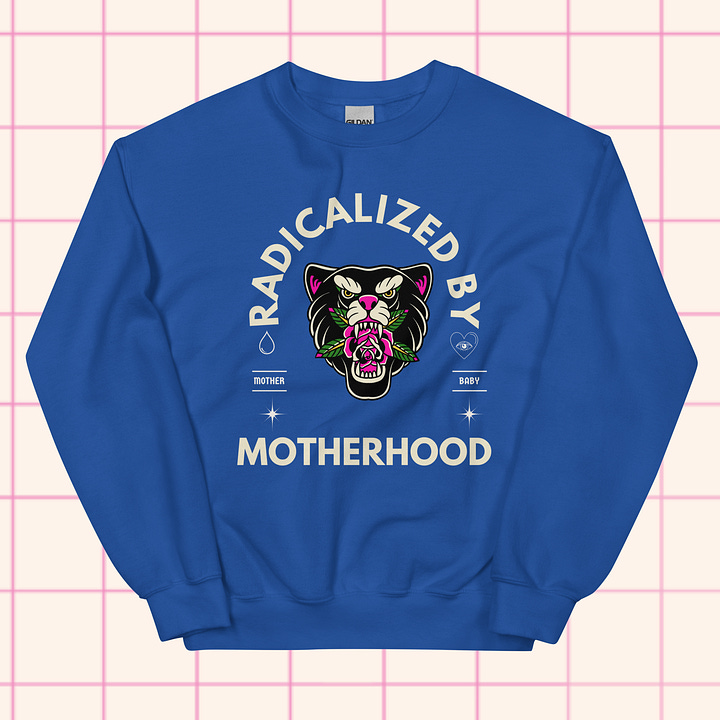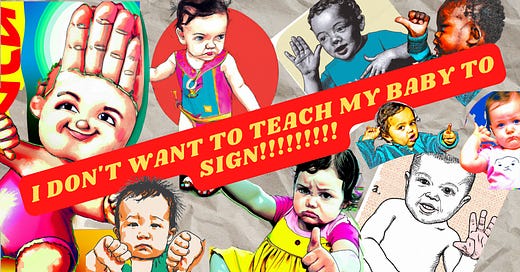I Don't Want to Teach My Baby to Sign!!! [free paywalled postie]
Why can't we just let babies liiiiiiive?
Welcome to our holiday programing, the clip show/greatest hits/syndication of Rad Moms blogs of years past. But first:
Oh, look, we have MERCH and you’re the first ones to know about it! Freak out the squares at the playground with fits that scream: MY PLACENTA IS IN MY FREEZER. All the cash you blow on our little store goes directly to our organizing work to build a movement of radical mothers.
🤰🏽👉 ❤️🔥 👉 👁️ 👉 Link to our store front. 👁️👈 🤱🏻👈🤰🏼👈


After I wrote this piece I felt a little timid sending it out as I had some friends on our subscriber list that were trying to teach their babes to sign. I didn’t want my parenting choices to seem like some sort of critique on theirs. At the same time, this blog was started with the belief that we should be able to discuss motherhood in public without falling over ourselves with apologies and caveats. Of course, this tension between wanting to endlessly explore your own views on mothering whilst not pissing off other moms in the playgroup is just, like, eternal. Two years later, I still feel a little squidgy when I’m around other mothers and I express some sort of parenting choice I’ve made or opted out of. I can only unclench my butt cheeks when the other mom reassuringly says, “same.” What a delicious and rare experience that can be.
I have a very social, very vocal little 11 month old meatball-shaped baby. Throughout the holiday season several in-laws, other moms, and strangers have asked if she knows sign language. Some have even mistaken her hand gestures for signs and encouraged her to sign for “more” and “tired”.
Listen, if you taught your kid signs or plan to, Godspeed. I’m not here to trash any parent for their choices but this is a distinctly American parenting fad that does not resonate for me.
It feels like another weird rush to get my baby to “do” something besides just being a baby.
I assume the trend comes from a several factors:
It's fun to communicate with your baby! I get it. I love when we clap together or imitate each other. Anything that demonstrates a shared understanding between us is a thrill so I understand the impulse to teach some rudimentary signs to your babbling bebe.
The ever present societal wish (and pressure) to give your kid any sort of cognitive advantage, add an extra IQ point, give them a leg up in the meritocracy. And look, if you’re teaching your baby signs you're doing a great job as a parent. You’re interacting with them, you’re curious about their inner lives, you’re making big silly faces while holding three fingers up to your mouth and waiting for their reaction. You are investing directly in your baby and that’s the biggest thing that’s going to make all the difference.
I assume it’s also a product of putting kids into daycare before they’re verbal, it’s easier for providers to read signs than all the subtle clues that only a parent could decipher.
But here’s my hang up: we expect babies to do so much! Self-soothe, sleep through the night, share toys, wave bye bye, mingle with strangers, and so on. Now we expect them to communicate their needs directly to us in language we understand before they can stand on their feet. It also feels like a further push to split up the dyad in two and get that baby on the road to independence.
And for all the hype that says signs can help your baby with emotional regulation and IQ points, I have a feeling that it has more to do with highly invested parents than rudimentary signs. Plus, for all you ‘data-driven’ types, there’s no control studies that actually prove these claims. There’s also no proof that babies ‘understand’ gestures before they understand words.
Dig if you will:
Babies are already hard wired to approximate words they hear from their parents, particularly easy words like “ma” “da” and “ba”. Do babies understand the actual meaning of something like “baba”'for a bottle? Or just when they say “ba ba” they get handed a bottle and so continue to do it. Nobody knows!
You can teach a baby to approximate signs but there’s no scientific evidence that they understand the meaning of signs before they understand the meaning of spoken words.
The other thing I find strange about the sign language hype is that parents are teaching their babies American Sign Language for the deaf instead of pantomiming. We’ve learned from numerous studies on language acquisition that we learn language using symbolic thought, in other words by pantomiming. Remember the exaggerated gestures your high school Spanish teacher would make? Pretending to flip the pages of a giant invisible book while saying 'LA BIBLIOTECAAAAA. That’s the whole thing about us weirdo apes and our giant brains, we’re suckers for symbols.
Children also learn language best when we talk with them, one-on-one, and use nonverbal cues — like pantomime and pointing — to get our meaning across.
So while putting your hand to your mouth and chewing is ASL for “food,” the sign for a “bath” is rubbing your chest (which is not how I would pantomime bath) or “apple” is digging your knuckle into the side of your cheek. This doesn’t seem helpful. You’d probably have a better time of it if you pantomimed eating an apple.
I also see the signs for “please” and “thank you” included in all these ‘Baby’s First Signs’ worksheets. Which I guess is useful but also feels like overkill to be working on manners with a creature that cannot control their own bowels yet???
For me this 0-2 yrs old era is so delicious because my baby and I operate so far outside the rest of society. We’re naked all the time, we eat with our hands and we sleep in the middle of the afternoon. We share an immune system, a bed, my body, food, and a sleep cycle. Her is language raw and elemental and I delight in the fact that I’m the only other person who is a native speaker.
Never will we exist like this again. Why bring the flimsy trappings of civilization into this ancient relationship? For the rest of her life she’ll be formed by the tidal forces of the outside world but for now, she is a perfect creature in a primitive universe. It’s my job to understand her, not to make her be understood.
More from us:
I also like reading poetry, here is a good poem on your way out.
********
If I Sleep While My Baby Sleeps
I will hear his sleep in and through my own, my sleep will be bathed in his as if we slept in one same fluid My sleep floats within a listening so deep that the separating spaces of air become as pliant and full as snowfall, its singing silence as profound My ears and his throat — the sensation of anticipated hearing close inside the ear and the incipient murmur or cry forming at the end of his sleep — borne like birds and thrumming on the air of rooms between us My own sleep will be his clock, safely keeping time, his sleep tunes my dreams to listen, our sleep binds the hour, heavy and warm, into a blanket of air and sound









Like many things, there's a time and place where it is appropriate and/or necessary. I agree that most normally-developing kids don't need to learn baby signs, but it can be a lifesaver for some.
My eldest was very verbal and had a large vocabulary as a toddler but would "lose her words" whenever she was the slightest bit hungry, tired, or stressed in any way. She turned out to be on the autism spectrum, and at 24 she still tends to lose her words when she's upset. She was almost 2, and as I said had a very large vocabulary, but struggled to communicate her needs. For example, if she was thirsty, instead of asking for water, she would just start screaming at the top of her lungs and it was very difficult to calm her down. I taught her signs, and noticed that while she couldn't seem to remember the *word* for "drink" when she was thirsty, she had no problem remembering the sign. She also really struggled with things like "please" and "thank you," perhaps due to the abstract concept (autistic kids tend to be very concrete thinkers) so getting her to say "thank you" usually provoked a meltdown - but she would make the sign for "thank you" with no problem.
My middle daughter was about a year old at the time, and she just sort of picked up the signs by watching her older sister. As it happened, that was a good thing because she didn't actually start talking until she was almost 2; but she was very adept with signing and got her point across. Sometimes I wonder if her facility with signs played a part in her late talking; but my mother-in-law tells me my husband didn't talk until he was 2 either. She takes after my husband in many ways; and grew up to be an network engineer just like him - I have heard that late talking is very common amongst those who grow up to be engineers.
I did not bother with signs with my 3rd baby as she had completely normal language development, plus her older sisters seemed to intuitively know what she wanted and would translate if necessary!
It's really interesting to hear thoughts on this from an American perspective. I'm in the UK (England, specifically) and we have much less of a push on excellence and IQ points etc for babies/young children (at least, as far as I've noticed) so these things never even crossed my mind when I started signing with my babies.
"It also feels like a further push to split up the dyad in two and get that baby on the road to independence." - this is an intriguing point, especially. I went to baby sign language with all three of my kids and although I was by no means consistent with it outside of class, I did teach them all some of the very basic signs. I didn't do it for independence so much as to be able to help them more myself, and to be able to communicate with them even more than I already do. Just because this is my experience, though, obviously doesn't mean you're wrong, but I think the culture of where you're raising your kids must have a big impact on how these sorts of things are perceived. It sounds like where you are, babies are being willed toward doing things for themselves much quicker than they should be (not your baby, from what you've said but the babies around you) so of course teaching them language would seem like a part of this. Where I am, I'm fortunate to be in a small pocket of society that champions co-sleeping, extended breastfeeding, babywearing and responsive caregiving - as such, signing with our babies feels like an extension of the dyad, rather than an attempt to break it up
Not in any way trying to say you're wrong, just interested in how different perspectives can be on a topic. Thank you for sharing yours